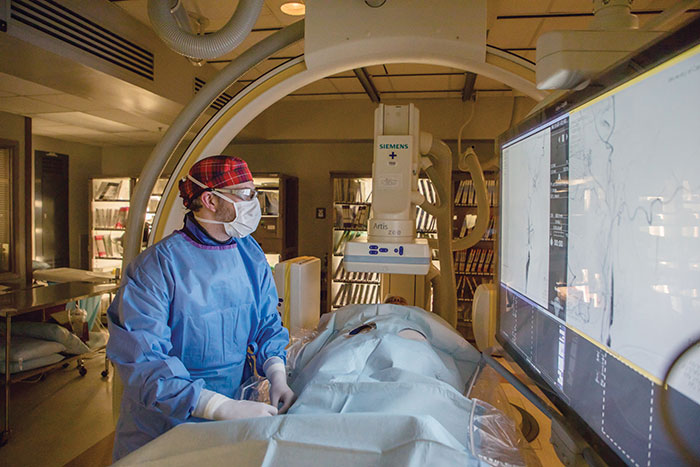
University of Kentucky patients are getting quick access to cutting-edge medical treatment ideas and health outcomes in the commonwealth are improving through a two-year-old pilot program that is leading to external funding for full research trials.
The Multidisciplinary Value Program (MVP) brings together UK medical researchers, scientists of different disciplines and expert clinical physicians to offer new trials or therapies in clinical settings. Dr. Robert DiPaola, dean of the UK College of Medicine, said the goal is simple: get new science to patients sooner.
“If there’s a discovery in a laboratory, it could take 10 years (under traditional processes) before it actually gets into the clinic,” he said. “This (the MVP) was constructed to increase the speed by which we have an impact for the discoveries that are made at the University of Kentucky.”
Shortly after beginning his tenure as dean of the College of Medicine in March 2016, DiPaola developed and launched the MVP in conjunction with Lisa Cassis, UK’s senior vice president of research, and UK’s Center for Clinical and Translational Science (CCTS). It built on the university’s existing translational research capacity by bridging areas of strength across disciplines and clinical specialties.
They set aside an initial $1 million pool for MVP grants and invited researchers and clinicians to submit proposals. More than 30 teams applied. Priority for grants was given to teams including at least one member with strongly funded research, a physician investigator, and projects relevant to the health challenges and disparities faced by Kentucky. To be eligible for a grant, a team was required to have a project ready to quickly “make an impact,” DiPaola said.
The award process was facilitated by the pilot funding infrastructure of CCTS, which seeks to accelerate the pace of discoveries for human health and specifically the health challenges of Kentucky and Appalachia. Eight of the 13 U.S. counties where life expectancy is declining are in Appalachian Kentucky.
“There are many health challenges that dominate the landscape of Kentucky, including cancer, heart disease, stroke, diabetes and substance abuse,” said Dr. Philip A. Kern, director of the CCTS. “The best efforts to address these pressing problems will not come from the lone researcher in his lab, but from a collaborative team where each member builds on each other’s special expertise.
“The MVP program accomplishes this,” Kern said, “by building teams that include physicians, basic scientists and other health professionals with a goal of exploring new ideas, soundly rooted in science, that have a high likelihood of becoming the therapies of the future.”
Nine teams were awarded funding to conduct trials and get new therapies or protocol out of the lab and into the clinic. Eight of those teams have gone on to conduct trials. So far, the teams have been awarded 12 additional external grants to continue their work. Those external grants “were about fourfold the amount that we invested,” DiPaola said. “That’s exceptional.”
MVP research teams are tackling tough health-care issues such as addiction treatment, stroke, sepsis, amyotrophic lateral sclerosis (ALS, formerly called Lou Gehrig’s disease), colon cancer, acute lung injury and other challenges.
A chance to save lives and millions of dollars
For UK internist and faculty member Dr. Laura Fanucchi, the Multidisciplinary Value Program was a chance to explore better treatment options for patients who suffer from opioid-use disorder (OUD) and a resulting bacterial infection called infective endocarditis (IE).
Increased rates of injection drug use have led to a rise in incidences of IE, an infection of the lining of the heart and heart valves, and other severe bacterial infections. Without treatment, it can be fatal. The infection requires prolonged antibiotic treatment administered through a peripherally inserted central catheter (a PICC line) in a vein returning blood straight to the heart.
IE sufferers who are not opioid-addicted are able to receive prolonged antibiotic therapy at home and on an outpatient basis after becoming stable. But patients with a history of substance abuse must stay in the hospital – as long as six weeks – for treatment due to concern about drug use through the PICC.
Extended hospitalization forces opioid withdrawal, Fanucchi said, which can create such tension between patient and health-care providers that it leads to early discharge and recurrence of endocarditis.
“Once you’re feeling better, it’s really hard to stay in the hospital for six weeks,” she said. “It’s boring, you’re away from your family, and it’s expensive.”
Patients need evidence-based treatment to repair their hearts, Fanucchi said, but the underlying cause of endocarditis – opioid addiction – lacks evidence-based treatment and intervention during hospitalization. Using MVP funds, her team set out to prove hospitalization for endocarditis presents an opportunity to introduce medication-assisted therapies for opioid use, such as buprenorphine (Suboxone), methadone or naltrexone. They also wanted to find out whether patients in medication-assisted therapy for opioid use could safely (and simultaneously) receive antibiotic treatments at home and in an outpatient setting.
“There are no data to suggest that keeping these patients in the hospital affects rates of completion of antibiotic treatment or of reoperation or that doing so prevents illicit drug use. There may in fact be harm associated with prolonged hospitalization …,” wrote Fanucchi and Dr. Michelle R. Lofwall, an addiction medicine specialist at UK, in a 2016 article published in the New England Journal of Medicine.
The team recruited 20 patients with OUD and IE to participate in a randomized clinical trial. Ten patients were medically stabilized and released from the hospital, then received intensive, transitional outpatient antibiotic therapy and medication-assisted therapy (buprenorphine); the remaining participants were hospitalized and administered antibiotics, as well as buprenorphine for opioid use. Patients who left the hospital earlier had an average length of stay about 20 days shorter than those hospitalized full time, Fanucchi said.
The results: All patients finished their antibiotics, and the proportion of study participants who reported illicit opioid use while on the buprenorphine was about the same in the two groups, she said.
“It was actually a little bit better in the group that left early,” Fanucchi said. “We felt like the results suggest this is a possible model (of care) that is feasible and safe for a population of patients.”
The study was not large enough to show whether one model is better than the other, she said, “but it was big enough to show that is a reasonable thing to try. I think we need better models than just keeping people in the hospital for six weeks.”
“Not only is it very costly, but it’s not what patients want to do,” Fanucchi said. “And it may not necessarily be safer from a long-term outcome treatment perspective.”
If replicated in a larger study, these results could support outpatient care for some opioid-addicted patients with endocarditis. It could save lives and millions of dollars, she said.
Her team has applied for federal funding to conduct a larger trial to demonstrate efficacy. If approved for funding, the larger trial would likely start in the summer of 2019.
“That was the big point of the MVP program, to internally fund small pilot studies that can be used as preliminary work to support external proposals,” she said.
Improving stroke care, recovery
Stroke is the third leading cause of death in Kentucky and the fifth nationally. But strokes occur at an earlier age in the commonwealth than in the rest of the country.
Despite the prevalence of stroke, current standards of care include only two potential treatments. Both can be highly effective in removing the clot that caused the stroke, but neither therapy treats injuries caused by it.
Dr. Gregory Bix, director of the UK Center for Advanced Translational Stroke Science, whom DiPaola calls a “superstar in the laboratory,” teamed with neurosurgeon Dr. Justin Fraser to develop new treatments using existing therapies to protect brain tissue after a stroke. With funds from the MVP program, Bix and Fraser developed a clinical trial called MAVARIC (Magnesium and Verapamil After Recanalization in Ischemia of the Cerebrum).
It investigates administering Verapamil and magnesium sulfate, blood vessel dilators that are potentially neuroprotective, immediately upon minimally invasive surgical clot removal to reduce brain damage and promote healing in stroke survivors. (A related study, called BACTRAC, is developing a tissue bank of thrombi (stroke-causing clots) and distal and peripheral blood to examine the immediate molecular changes that occur at the stroke site. Both studies are the first of their kind.)
“Patients coming in today now have an option under the umbrella of the clinical trial,” DiPaola said, “of not only getting the treatment that might be the best standard of care – bringing in a catheter (threaded through blood vessels) to remove the clot – but at the same time infusing these agents (magnesium and Verapamil). It gives a patient an option for something that wouldn’t have been available before.”
The same can be said for patients involved in the other MVP trials too, DiPaola said. They have treatment options for serious illnesses that were not available just a year or two ago.
“This program is a novel model that can not only do great things for UK research but also save lives and allow our citizens to participate in research that will improve their lives,” said Cassis.
“I am especially excited about the potential for these initial teams … to develop into broader groups of interdisciplinary teams that are competitive for large grant mechanisms. These large applications give us the best chance of having the most significant impact on these health disparities that our citizens experience.”
The other MVP projects include teams studying:
• Altered lipid metabolism as a novel target for colon cancer treatment.
• Treatment of FUS-related ALS with betamethasone.
• Assessing effects of electronic cigarettes on airway resistance in asthma.
• Early anti-inflammatory treatment in patients with acute ACL tears and painful effusions.
• The INFUSE trial (Intervening with Platelet Transfusions in Septic Patients).
• Mechanisms and treatment of skeletal muscle weakness in acute lung injury.
• Application of theory and evidence to promote full recovery from pediatric injury.
Sponsors Sought to Fund More MVP Teams
With eight clinical trials underway or completed and 12 external grants received so far, the Multidisciplinary Value Program is proving to be a success.
The MVP provides researchers the opportunity to conduct more clinical trials and publish the results, and then “it becomes even broader than just an opportunity for patients in Kentucky,” DiPaola said. “They (the researchers) apply for federal grants, go to podium sessions nationally to broadcast what they’re doing here and their results. That’s how you lead to new standards of care and national impact for us.”
To build on the success, continue the momentum and fund even more research projects that are ready for pilot clinical trials, the university is seeking outside funding from potential donors.
“Typically, it takes about $100,000 to have these (teams) launched, but think of what it’s doing: taking new discoveries and getting them to have impact in the clinic with a high rate of return and follow-up,” DiPaola said. “We’ve been working on more fundraising for opportunities to sponsor a team or part of a team to be able to continue to do this (program) over time.”
Any business or organization that would like to learn more about how full or partial sponsorship of an MVP team might work can contact Kim Harris, senior director of philanthropy in the UK College of Medicine, at (859) 257-3145 or [email protected].
To learn more about MVP, visit med.uky.edu/mvp-teams.
Lorie Hailey is a correspondent for The Lane Report. She can be reached at [email protected].




















Add Comment